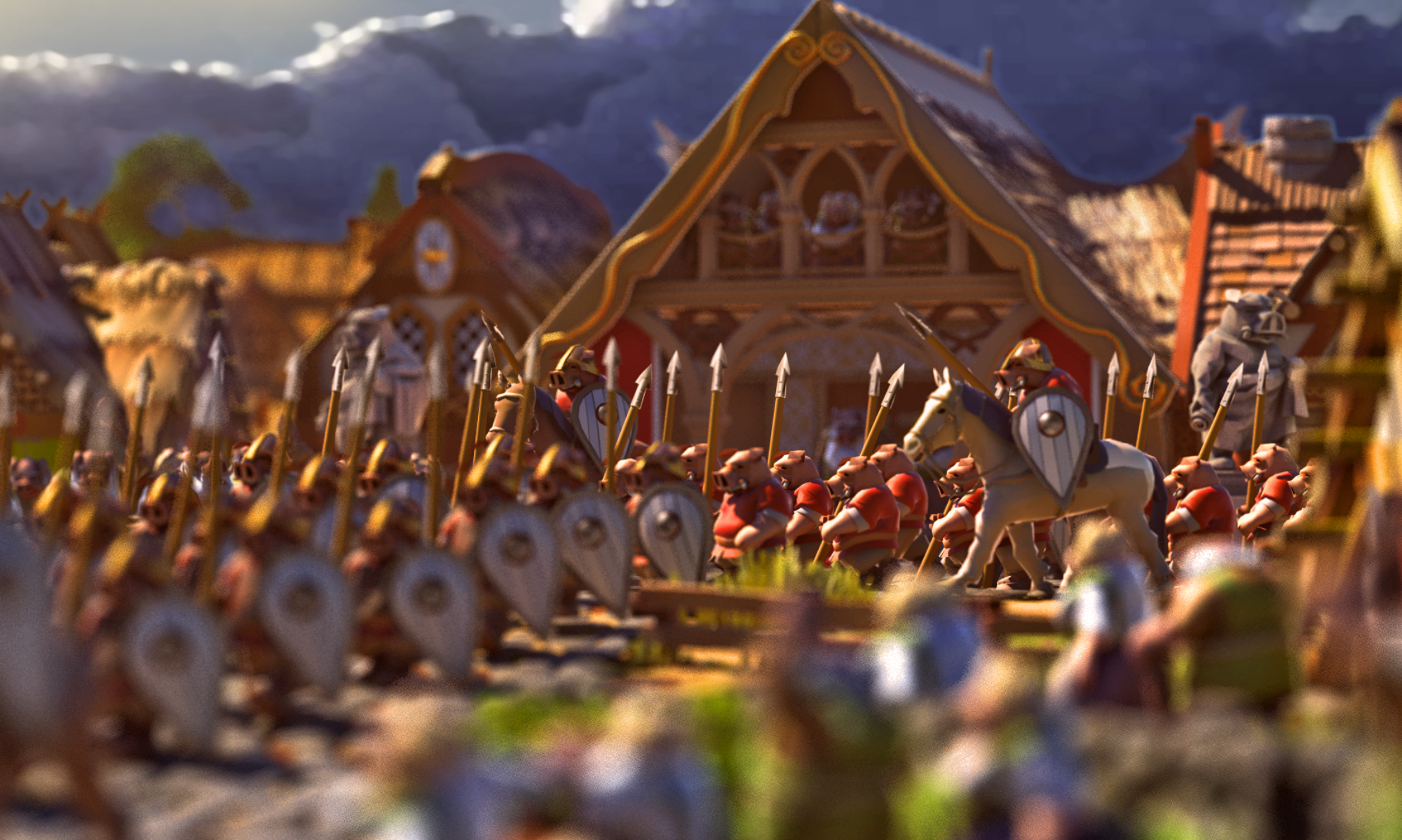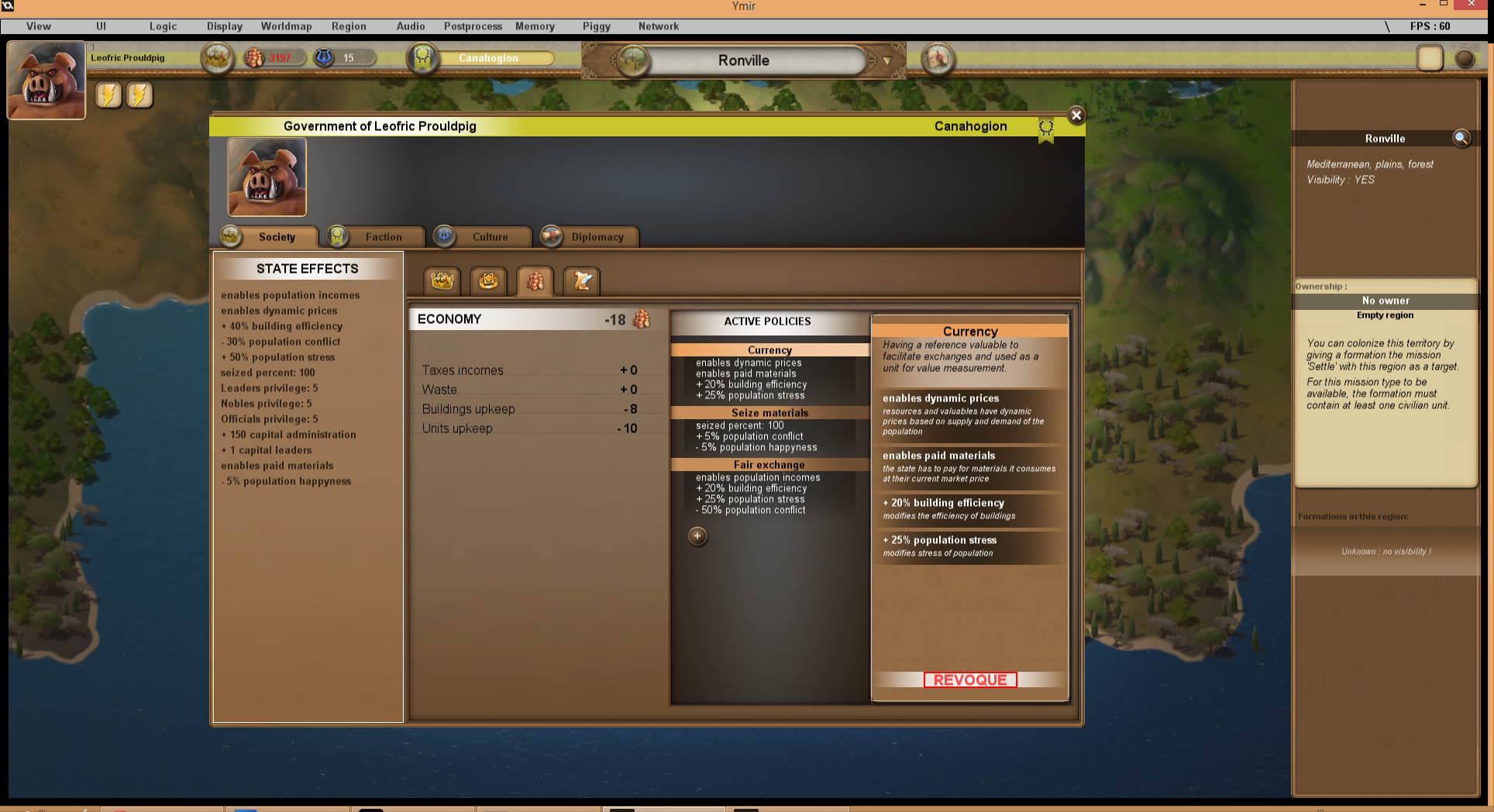CUSTOM POLITICS
Finally i’ve started implementing new features to Ymir since the Alpha 1 prototype. I’ve designed and almost completed the implementation of ‘politics’, and also made this new government menu to manage it.
Politics are completely modular, and although that can create some confusions i’ll need to sort out with time.
You have a list of ‘policies’ organized in categories. Each policy has one or more effects. The system is modular, so policies can be combined in any way you want.
On the left column you can see a summary of all the effects of all the currently active policies, and on the right you can manage each policy per category, add new ones or remove them.
You start only with default policies as active, and you’ll unlock new ones as you develop technologically.
You start as a “band society” with a “gift economy”. This matches the most primitive forms of societies : small famillial groups with informal leadership and where people exchange things without expecting immediate reward.
This isn’t translated ingame only with stats modifications, but also in gameplay itself: entire mechanics can be locked or unlocked by these policies. For instance in such a primitive society there is no “money”, meaning you have a state have no income but also no expenses, all resources are automatically available to everyone and there is no need for organized distribution through merchants and markets yet.
Then as you evolve you can enable new policies like the notion of “Fair exchange” , meaning that instead of giving everything for ‘free’ ( expecting later rewards ) , people now exchange things expecting immediate reward ( exchanging things of ‘equivalent values’ to make it fair : barter economy ).
In some cases, the decision to enable some policies when they become available will be pretty much automatic like that one, because you can’t really expect to build a large society with a gift economy… but well , actually nothing will prevent you to try if you want!
For now i’ve added about 20 policies in 4 categories : power, legitimacy, economy , social.
Power
Power is how you organize the exercise of power in your society. You’ll find policies allowing you to do things like appointing local chiefs in each region, governors in each city allowing you to form provinces, or having parliamentary structures like a Senate…
Legitimacy
Legitimacy is about why the leaders of your society claim they should rule.
You can rule because you claim beeing superior to others, because you’re a god, because you’re chosen by gods and rule in their name, because you rule for the common good in the name of the people or because you rule as a representative of the people.
You can combine these as you wish. These claims then define which variables are taken into account to compute the actual legitimacy of your government.
For instance if you claim to rule as a representative of the people but without having any parliament or anything actually representing the people, this will be an empty claim giving you no legitimacy. So you’ll need to decide why you rule but then also do what it takes to make it credible enough to actually get legitimacy.
Things linked to gods will depend highly of religion of course.
Things like claiming to be a living immortal god will also depend on how superior you look to your people. So having your leader living in a commoner’s house is probably not going to be a good idea… Instead, building massive monuments in his name like a Pharaoh is probably what you’ll want to do.
Economy
Then you can manage your economy : currency, taxes, coinnage, representative money etc.
These affect directly the economic simulation, like unlocking dynamic population wealth or dynamic prices, the fact you’ll have to pay for materials when building something or not, the ability to setup foreign trade routes, or how your stocks of gold ingots can provide wealth with the use of representative money…
Social
As for social policies, for now its just limited to deal with government members. There is 3 population classes for government members : leaders, nobles and officials. There’s usually only one leader in the capital. Nobles depend of your power policies: for exemple having “local authority” enabled means you assign one local chief to each region, and that will show up ingame as having one noble in the population or each region.
Officials are the lowest class of government employees, you’ll get these from state buildings having “officials” as workers.
As part of the government these classes don’t get any regular incomes but with social policies you can give them privileges (they’re directly awarded a portion of the region wealth) or a fixed salary… or both.



Any news? More than one month since last blog post :O
The option of nationalizing an industry and making all its workers becoming officials could be interesting indeed.
The production of such “public industries” would belong to the state and all the relative sales incomes would directly go in the state coffers. Besides, it would give the useful ability to adjust directly the workers’ salaries.
But nationalizing should also have some drawbacks. In the real world, some economists argue that making an industry public is an obstacle to the natural market competition. In other words, it’s a kind of monopoly. This situation can lead to higher product prices (thus less purchasing power for the population), less product innovation, and possibly a decreased efficiency.
Anyway, it would be great to be able to reproduce different economics systems that we can see in the real world into the game. Like capitalism, communism, socialism, state capitalism (like in China where the state fixes itself all the market prices), liberalism… All of them have their advantages and inconveniences.
I didn’t mention it in my previous post, but the legitimacy system seems very cool and innovative too!
Thank for the answers Ronchon.
Yes, I meant barter-economies. I feel a bit stupid to not have used the correct word, since you wrote it in the blog post. My bad.
Anyway you understood and answered. I see and understand.
Two new questions :
Now than you talked about nationalisation of industries : all officials will have the same salary, or we could (maybe enabled because of a policy) set differents “class” of officials ?
What do you mean by “extremely instable society” for overcrowned gift-economies ? Will it be insta-chaos ? Or the player can still try (with a reasonnable, if low chance) to make it work ?
A gift economy is hardly viable beyond 100 individuals. Its a type of society that matched the most primitive human groups, where it was basically just a “familial” group where everyone could know each other.
Humans can only ‘remember’ about 100-200 other humans at a given point, that’s why when growing beyond that , this type of society becomes extremely unstable as you reach the point where members of the group can’t keep track of each other ( enabling stealing and making a gift system where you expect future rewards impossible because you do not know everyone anymore, that’s why you then need to exchange things immediately -> barter economy )
So nothing will forbid you from keeping a gift economy but its basically going to be extremely unstable beyond 150 of population.
As for “troc player” , you probably mean players with a barter economy.
That would translate ingame as a player having only the ” fair exchange” economic policy enabled.
That means this notion of “equivalent immediate exchange” is implemented, as opposed to the one of “future reward” characteristic of a gift economy.
That also means there is now a notion of owning valuables, and so yes having this enables the ability to have state “money”, even if in this case it just represent valuables that are not technically money, coins or currency.
Additionally it also enables population incomes, allowing them to accumulate wealth so they can start having a wealth >1.
So yes as soon as there is the notion of “fair exchange”, it includes the player himself, so he has to pay his population for the materials he uses when building stuff. Unless he doesnt want so and decides to seize them by force, using the “seize materials” policy.
However for example other economic aspects depend of other policies:
– Currency will unlock the ability to setup punctual trade offers with other players. It also unlocks all the dynamic pricing of resources system ( without it all resources are locked at 1 ).
– Coinnage will be required for players to setup permanent trade routes with each other.
So as you evolve, economy will gradually become more complex to handle but also more efficient and rewarding.
As for officials, so far they’re only used by all the storage buildings : warehouses, granaries …
But in the end, they’ll be used in any state building.
Also eventually i plan to add the ability to “nationalize” industries (as a social policy) : this will mean that workers of a building will become state employees and therefore “Officials” paid by the state instead of whatever class they where before.
Great news !
It must be refreshing for you to code new mechanism rather than redesign existing ones.
This whole politics system seems very interesting. Allowing players to personalize and specialize their societies with a direct impact on the gameplay is a nice feature. Unlocking new politics as the players develop is also a good way to scale their progression, gradually adding complexity to the simulation.
Granhyt already asked the good questions. I also wonder how a state with a gift economy would prosper and receive money, maybe by plundering, invading or blackmailing its neighbors.
Such a society would not focus on technologies or infrastructures but on a nomadic lifestyle allowing mobility, a large population (with slaves?), wide herds for food and primitive weapons to blackmail or plunder all the crossed territories. A bit like the ancient Mongols, Native Americans or the Dothraki in GoT for example.
This kind of mobile society could also offer its services as mercenary to other players , to round off its income.
It would be hazardous but fun to play :p
Okay, I saw this post the day it was posted, but I haven’t a lot of questions. So I waited to see if I’ll tought to something, but nope.
So here’s my two cents.
Policies : well done, especially since it’s not just numbers numbers bonuses, but some can unlock or lock mecanisms. Especialy the economic onces.
I wonder if a “troc-player” can still get money, given by another player probably.
Would a troc-player need money like everyone to build colonies ?
Which purpose fill the official employees ? Why do we may need them ?
I like the varieties of legitimacy reasons. Between been a god or been a guy doing his work in name of the people, maybe mixing them.
Would it be possible to have a “electif” system, like in Athens or Republican Rome ? But I suppose you never really change your supreme leader in Ymir.